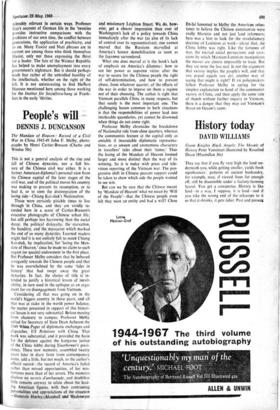People's will
DENNIS J. DUNCANSON
This is not a general analysis of the rise -and fall of Chinese dynasties, nor a full his- tory of the Chinese civil war either. It is a former American diplomat's personal view from the Chinese capital of the later stages of the civil war, and of the political moves his country was making to prevent its resumption, or to heal it, or to stem the disintegration of the losing sideChiang Kai-shek's Nationalists: Those were certainly pitiable times "to live through in China, and they are vividly re- corded here in a score' of Caftier-Bresson's evocative photographs of ' Chinese urban life; but still perhaps less harrowing than the Social decay, the political disloyalty; the starvation, the banditry, and-the massacres which marked the end of so many dynasties. Learned readers might feel'it is not entirely fair to mock"Chiang Kai-shek, by implication', 'for 'losing the' MOn- date' of Heaven,' since he made no claim to such august (or quaint) endowment in the first place. But Professor Melby considers that he behaved arrogantly towards the Chinese people and that he was overwhelmed by the same 'tides in history' that had swept away the great dynasties. In fact, the choice of title is""in- tended to justify a historical lesson of inevit- ability, in turn used in the epilogue as an argu- ment for us disengagement from Vietnam.
Considering all that was going on in the world's biggest country in those years, and all that was–at stake in the world power balance, the matter presented in support of this histori- cal lessdn is not very substantial. Before moving from chancery to campus, Professor Melby edited for Secretary of State Dean Acheson the 1949 White Paper of diplomatic exchanges and dispatches, US Relations with China. That work was substantial, and it provided the basis for the defence against the kangaroo justice of the China lobby during Eisenhower's presi- dency. These new memoirs, assembled twenty Years later in diary form from contemporary notes, add a little, but not much, to the author's official record—the record of America's failed rather than missed opportunities, of her mis- fortunes more than of her errors. The memoirs disclose no secrets d'ambassade, and doubtless little remains anyway to relate about the lead- ing American figures, with their contrasting Personalities and appreciations of the situation —Generals Hurley,aMarshall and Wedemeyer and missionary Leighton Stuart. We do, how- ever, get a clearer impression than ever of Washington's lack of a policy towards China immediately after the war (as also of its lack of control over its representatives); one cannot marvel that the Russians marvelled at America's honest demobilisation as "soon as the Japanese surrendered.
What one does marvel at is the book's lack of emphasis on America's dilemma : how to use her power as supreme victor after the war to secure for the Chinese people the right of self-determination, and bow to prevent abuse, from whatever quarter, of the effects of the war in order to impose on them a regime not of their choosing. The author is right that Vietnam parallels China in many respects, but that surely is the most important one. The challenging lesson common to both situations is that the responsibilities of power lead into intolerable quandaries, yet cannot be disowned when things do not come right.
Professor Melby chronicles the breakdown of Nationalist rule from close quarters, whereas the communists feature at the capital only as amiable if inscrutable diplomatic representa- tives, or as unseen and anonymous characters in travellers' tales about their 'zones.' Thus the losing of the Mandate of Heaven loomed larger and more distinct than the way of its winning. So it is today with press and tele- vision reporting of the Vietnam war. The pro- gressive shift in Chinese peasant support could be taken to show which side the people wanted to see win.
But can we be sure that the Chinese meant by 'Mandate of Heaven' what we mean by 'Will of the People'—that the Chinese people even felt they were an' entity and had a will? Chou En-lai lamented to Melby the Americas reluc, tance to believe the Chinese communists were really Marxists and not just land reformers; here was a hint to look for the revolutionary doctrine of Leninism at work—about that, the China lobby was right. Like the fortunes of war, the myriad social persuasions and coer- cions by which Marxism-Leninism manipulates the masses are almost impossible to trace. But they are none the less real. Is not the argument that victory implies the people's will, and that vox populi equals vox dei, another way of saying that might is right? If us policymakers follow Professor Melby in opting for the simplest explanation to hand of the communist victory in 'China, and then apply the same rule of thumb without further inquiry to Vietnam, there is a danger that they may cut Vietnam's throat on Occam's razor.






































 Previous page
Previous page